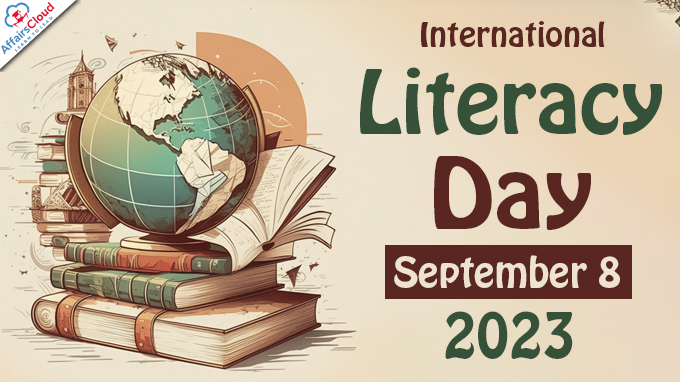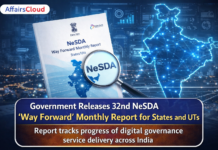 The United Nations Educational, Scientific and Cultural Organisation (UNESCO)’s International Literacy Day (ILD) is annually observed on 8th September across the globe, to remind the public of the importance of literacy as a matter of dignity and human rights, and to advance the literacy agenda towards a more literate and sustainable society.
The United Nations Educational, Scientific and Cultural Organisation (UNESCO)’s International Literacy Day (ILD) is annually observed on 8th September across the globe, to remind the public of the importance of literacy as a matter of dignity and human rights, and to advance the literacy agenda towards a more literate and sustainable society.
- The 2023 theme of ILD is, ‘Promoting literacy for a world in transition: Building the foundation for sustainable and peaceful societies’.
Background:
i.The idea of International Literacy Day was first propsed during the inaugural World Congress of Ministers of Education on the Eradication of Illiteracy held in Tehran, Iran in September 1965.
- The congress proposed to observe 8th September, date of the inauguration of the congress, as International Literacy Day to focus on the value of literacy for individuals, communities, and society as a whole and recognise it as the gateway to a well-educated and effective society.
iii.In 1966, UNESCO adopted the resolution UNESCO 14 C/Resolution 1.441 and proclaimed the 8th of September of every year as the “International Literacy Day.”
- The first-ever International Literacy Day was observed on 8th September 1967.
ILD and SDG:
i.ILD 2023 provides an opportunity to accelerate progress towards achieving the agenda of Sustainable Development Goal 4 (SDG4) on education and lifelong learning and to reflect on the role of literacy in building more inclusive, peaceful, just, and sustainable societies.
ii.The 2023 ILD marks the mid-point on the path to achieving the 2030 Global Agenda for Sustainable Development.
UNESCO strategy of Youth and Adult Literacy (2020-2025):
i.On 15 November 2019 at UNESCO’s 40th General Conference in Paris (France), the Member States agreed to adopt a new UNESCO Strategy for Youth and Adult Literacy (2020-2025).
- This strategy will be a guiding framework for the promotion of youth and adult literacy in the coming years.
ii.Closely aligned with the UNESCO Strategy for Youth and Adult Literacy (2020–2025), the Global Alliance for Literacy within the Framework of Lifelong Learning (GAL) Strategy was adopted in April 2020 and functions as a guiding framework for the Alliance’s work.
- Currently, 30 countries are strongly committed to improving youth and adult literacy.
Note: In Low- and Middle-Income Countries (LMIC), the share of 10-year-old children who could not read and understand a simple text with comprehension has increased from 57% in 2019 to an estimated 70% in 2022.
ILD 2023 Campaign:
On ILD 2023, the #ImALifelongLearner campaign was organised to share the literacy learning story.
- The campaign serves as a reminder that the right to education is a right to lifelong learning that knows no age limits.
UNESCO International Literacy Prizes (ILP):
On the occassion of ILD 2023(on 8th September 2023), UNESCO announced the winner of UNESCO International Literacy Prizes (ILP) which reward excellence and innovation in the field of literacy around the world to promote effective and innovative practices and encourage dynamic literate societies.
- Currently, there are 2 UNESCO ILPs, The UNESCO King Sejong Literacy Prize (3 awards) and The UNESCO Confucius Prize for Literacy (3 awards).
- UNESCO has awarded its 2023 ILPs to 6 outstanding innovative literacy programmes from Bangladesh, Dominican Republic, Finland, Pakistan, South Africa, and Uganda during ceremony held in Paris, France.
UNESCO ILP:
i.Since 1967, UNESCO ILP has recognised 512 projects and programmes undertaken by governments, Non-Governmental Organizations (NGOs), and individuals around the world.
iiUNESCO seeks to support effective literacy practices and encourages the promotion of dynamic literate societies thorugh these awards.
Winners of 2023 UNESCO King Sejong Literacy Prize:
- The GraphoGame programme by the GraphoGame organization (Finland) for its collection of top-tier literacy games in 14 different languages attracting over 5 million users.
- The Himalayan Literacy Network (Pakistan), is an NGO that brings quality preschool and primary education closer to remote Bakarwal communities.
- The ‘Africa e-Library project’ by Snapplify (South Africa), a leading edtech company offering digital learning solutions for individuals and institutions.
About UNESCO King Sejong Literacy Prize:
i.Established in 1989, with the support of the Government of the Republic of Korea, it gives special consideration to mother language-based literacy development.
- Each of the 3 prize winners receives a medal, a diploma, and USD 20,000.
ii.Purpose: To reward the efforts of institutions, organizations, or individuals for their contribution to the fight against illiteracy in commemoration of King Sejong who invented the Korean alphabet.
Winners of 2023 UNESCO Confucius Prize for Literacy:
- The ‘Empowering remote and climate vulnerable communities with digital literacy’ Programme by Friendship (Bangladesh).
- The ‘My Very Own Library: Cultivating a culture of reading in the homes of children in the Dominican Republic’ Programme by Dominican Republic Education and Mentoring (Dominican Republic).
- The ‘Peaceful Communities’ Programme by Uganda National Self-Advocacy Initiative (Uganda) is a peer-led organization for individuals with psycho-social disabilities in the rural Kayunga District of Uganda.
About UNESCO Confucius Prize for Literacy:
i.Established in 2005, with the support of the Government of the People’s Republic of China, it gives special consideration to functional literacy, leveraging technological environments, in support of adults in rural areas and out-of-school youth.
- Each prize winner receives a medal, a diploma, and USD 30,000.
ii.Purpose: To honour outstanding programmes of institutions, organizations, and individuals in view of supporting effective literacy practices and promoting dynamic literate societies.




